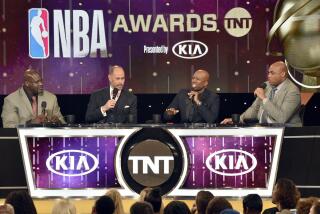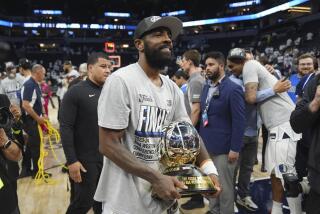76ers’ Star Is Adjusting Well to New Role of Supporting Player : Even in the Twilight of Dr. J’s Career, He’s More Than Willing to Work Late
BOSTON — It seemed like old times for a minute or two Sunday, Dr. J posting up against the Boston Celtics. He made his first shot, banking the ball off the backboard from eight feet, and his second, a turnaround jumper from 13 feet. Just like old times.
But four minutes into Game 1 of the Eastern Conference championship series at Boston Garden, Charles Barkley rumbled onto the court for the Philadelphia 76ers, positioning himself near the basket, in the operating room, and sending Julius Erving to the wing.
His response was the same as it has been since the beginning of the season. The good doctor went without a complaint.
Somewhere in the transition, though, his game was lost.
When it was over, the box score showed that he had taken 18 shots and made five, only one in the final 22 minutes.
He finished with 12 points, far too few to make a difference in the 76ers’ 108-93 loss to the Celtics.
The morning after, looking ahead to Game 2 tonight at Boston Garden, Erving vowed, “If I take 18 shots again, I’ll hit 9 or 10 of them. I won’t hit only five of them again. No way.”
Still, he knew, at 35, that once again he had to face the questions about his place in the game, and with the 76ers, and whether it is enough to satisfy him.
He began to hear the questions early this season, after the 76ers’ second regular-season game against the Celtics.
In the fourth quarter, when the game was on the line, the 76ers’ forwards were Barkley because of his rebounding and Bobby Jones because of his defense. On the bench was Dr. J.
His role has been changing gradually ever since Moses Malone arrived in Philadelphia three years ago. Instead of being the straw that stirs the drink, Erving had become the second and sometimes third option in the 76ers’ offense.
But never until that game against the Celtics had a team he played for, the 76ers or any of the others in his 13-year professional career, sat him down in the crucial moments of the fourth quarter.
No one had to explain it to Erving.
He knew the day would come, and when it did, he was prepared for it.
“Doc handled it exactly like I expected he would,” 76er Coach Billy Cunningham said. “You never have a problem with Doc.”
The 76ers weren’t telling Erving that he wasn’t wanted. On the contrary, they encouraged him in his decision this winter to play for at least one more season.
“All we’ve asked him to do is be flexible,” Cunningham said.
Interpretation: The 76ers still want Erving to score, rebound and play defense, but they don’t necessarily expect him to be able to do it all in the same game, as he once could.
Sunday, his role was on defense against Larry Bird.
Erving was not embarrassed by Bird’s quiet 23 points, although it’s impossible to know how many Bird might have scored if not for the painful bone chips in his right elbow.
In retrospect, Erving said Monday morning that having to be responsible for Bird on defense might have caused his offensive problems.
“All week long, my concentration and emphasis was on finding out what I was going to do defensively,” he said. “I might have neglected some things offensively that needed work. I might have taken my offensive game for granted.
“Also, any time you have to guard a Bird or a Bernard King or an Alex English, those guys who are capable of scoring from 30 to 50 points, you have to sacrifice some of your offense along the way. There’s going to be a fatigue factor.”
Another factor, of course, is the emergence of the rookie, Barkley.
Cunningham would like to have Barkley and Erving on the court at the same time as much as possible. But since Barkley can’t possibly be effective as a perimeter shooter, Erving has to go to the wing, where he has never been comfortable.
Some days the shots go down.
Other days are like Sunday.
“My responsibilities were different three years ago, four years ago,” Erving said. “The team centered around me the way the Celtics center around Larry. I had to go out night after night and let it all hang out. I was the thoroughbred in the race.
“Now, even though I still think I have some thoroughbred in me, I have to give some of the other thoroughbreds a chance.”
Asked if that means the days of Dr. J taking over a game are in the past, he said, “It depends on what you mean by taking over. If it’s just taking the ball and scoring, we have plenty of guys who can score, including myself.
“But I’d say the days of me coming in the backcourt and taking the ball off of a guard and saying, ‘I’m going to make the play,’ are over.
“Now, my role depends on what Moses needs and what Andrew Toney needs and what Charles Barkley needs. If I’m successful, and we blend together as a team, that gives Billy what he needs.
“Statistically, I’m not getting better. But I’m getting better about guaranteeing the success of our team. Before, I could only guarantee individual success.
“I guess what I’m trying to say is that I’ve had to learn a lot more about what it takes to win. I didn’t always knows what it took to win.
“Five or 10 years ago, I might have been somewhat resistant to change in terms of accepting a role. But I don’t know. Nobody asked.”
One good thing about the change is that it has added years to Erving’s career.
“If my role was the same as it was in 1980 and ‘81, I wouldn’t still be playing,” he said. “I wouldn’t have enough stamina.”
Is the game as much fun now, he was asked.
“No, it was more fun for me before,” he said. “But this is probably more satisfying.”
More to Read
Go beyond the scoreboard
Get the latest on L.A.'s teams in the daily Sports Report newsletter.
You may occasionally receive promotional content from the Los Angeles Times.










